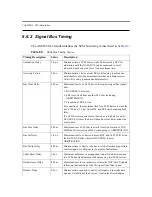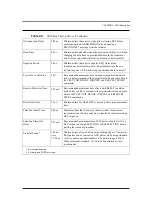
APPENDIX A: SDLT I Tape Cartridge
•
Avoid unnecessary opening of the cartridge door; this may expose the tape to
contamination or physical damage.
•
Do not use graphite pencils, water-soluble felt pens, or other debris-producing
writing instruments on your labels. Never erase a label — replace it.
•
Make sure you place the unused cartridge labels in the protective box so that
you do not inadvertently pick them up along with the cartridge during
subsequent usage. A static electricity charge on a cartridge may cause a label
to cling to the cartridge. A label that is accidentally inserted into the drive
along with a cartridge can prevent the hub reel and drive gear from meshing.
•
Maintain clean operating, working, and storage environments.
•
Follow all tape cartridge handling instructions that accompany your cartridges
or tape drive.
A.2 Tape Cartridge Inspection Procedure
Ensure that your tape backup solution performs reliably by following the Visual
Mechanical Inspection (VMI) procedures described in this subsection. These steps
will help you identify any potential tape cartridge problems, and will prevent
accidental loss of data or damage to your SDLT system.
You should do a VMI:
•
As a general practice whenever you change or load a new tape cartridge,
•
If a tape cartridge is dropped or subjected to some hard physical shock,
•
If the SDLT drive becomes inoperable after loading a tape cartridge, or
•
If you receive a shipment of tape cartridges that show any sign of shipping
damage.
Summary of Contents for SDLT220-320 INTEGRATION
Page 1: ...TANDBERG Super DLTTM Product manual Revision 2 June 2002 432589 01...
Page 20: ...CHAPTER 1 Introduction...
Page 34: ...CHAPTER 2 SDLT 220 320 Product Information...
Page 52: ...CHAPTER 3 Drive Specifications...
Page 76: ...CHAPTER 4 Installing Your Tape Drive...
Page 92: ...CHAPTER 5 Using Your Tape Drive...
Page 104: ...CHAPTER 6 SCSI Description...
Page 120: ...APPENDIX A SDLT I Tape Cartridge...
Page 130: ...APPENDIX B DLT IV Tape Cartridge...
















































